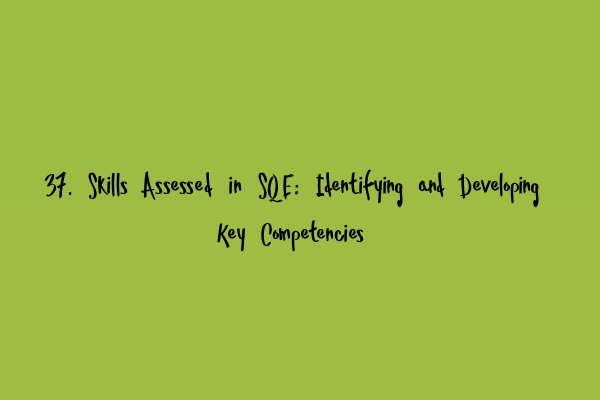37. Skills Assessed in SQE: Identifying and Developing Key Competencies
As aspiring solicitors embark on their journey to becoming qualified, they must first pass the Solicitors Qualifying Examination (SQE). This comprehensive exam assesses a range of skills and competencies crucial for success in the legal profession. In this blog post, we will explore the 37 skills assessed in the SQE and discuss the importance of identifying and developing these key competencies.
Before delving into the skills themselves, it is essential to understand the structure of the SQE. The examination is divided into two stages: SQE 1 and SQE 2. SQE 1 tests candidates on their functioning legal knowledge, while SQE 2 focuses on practical legal skills. Both stages are designed to evaluate a candidate’s ability to perform tasks relevant to real-life legal practice.
Now, let’s explore the 37 skills assessed in the SQE:
1. Legal research and analysis: The ability to locate and assess legal resources effectively is fundamental to legal practice. Candidates must navigate various sources of law and analyze their content in detail.
2. Problem-solving and critical thinking: Solicitors must be able to identify legal issues, analyze complex scenarios, and come up with practical solutions. Critical thinking skills are crucial for effective decision-making.
3. Drafting legal documents: From contracts to pleadings, solicitors must possess excellent drafting skills. The SQE assesses candidates’ ability to produce clear, concise, and legally accurate documents.
4. Writing and communication: Strong written and verbal communication skills are essential for solicitors to effectively convey legal information to clients, colleagues, and other parties involved.
5. Advocacy and oral presentation: The SQE evaluates candidates’ ability to present legal arguments orally, whether in a courtroom, negotiation table, or client meeting.
6. Negotiation and settlement: Good negotiation skills are crucial for solicitors to secure favorable outcomes for their clients. Candidates are tested on their ability to negotiate effectively and reach settlements.
7. Interviewing and advising clients: Solicitors must be skilled in conducting interviews to gather crucial information from clients and provide appropriate legal advice. The SQE assesses candidates’ ability to engage with clients effectively.
8. Professional ethics: Upholding high ethical standards is essential in the legal profession. The SQE tests candidates’ knowledge and understanding of the Solicitors Regulation Authority (SRA) Code of Conduct.
9. Business and financial awareness: Solicitors need to have a good understanding of business and financial concepts, as they often play a role in commercial transactions and legal decision-making.
10. Case and matter management: Effective organization and management of legal cases are essential for solicitors. The SQE evaluates candidates’ ability to handle multiple cases and prioritize tasks.
11. Working with others: Collaboration and teamwork are integral to legal practice. Candidates are assessed on their ability to work effectively with colleagues, clients, and other stakeholders.
12. Time and task management: Managing time efficiently and prioritizing tasks is crucial for solicitors. The SQE assesses candidates’ ability to meet deadlines and juggle multiple responsibilities.
13. Client care and service: Providing excellent client care is essential for solicitors. Candidates are tested on their ability to understand client needs, communicate effectively, and deliver a high standard of service.
14. Legal technology and information management: In today’s digital age, solicitors need to be proficient in using legal technology and managing information securely. The SQE assesses candidates’ knowledge and skills in this area.
15. Risk management and compliance: Solicitors must be aware of potential risks and comply with legal and regulatory requirements. The SQE evaluates candidates’ understanding of risk management principles.
Throughout the SQE, candidates will encounter questions and scenarios designed to assess these 37 skills. It is crucial for candidates to identify their strengths and weaknesses in each area and focus on developing key competencies to excel in the exam.
To aid in your preparation, FQ Professional Skills offers a range of SQE preparation courses. Our SQE 1 and SQE 2 Preparation Courses are designed to equip candidates with the necessary knowledge and skills to succeed in the examination. Additionally, our SQE 1 Practice Exam Questions and SQE 1 Practice Mocks FLK1 FLK2 provide invaluable opportunities for candidates to practice and familiarize themselves with the exam format.
For more information on SQE preparation courses and SRA SQE exam dates, please visit our website. We are committed to helping aspiring solicitors achieve their goals and excel in the Solicitors Qualifying Examination.
In conclusion, the SQE assesses a wide range of skills and competencies crucial for success in the legal profession. Identifying and developing key competencies is vital for aspiring solicitors to excel in the exam and thrive in their future careers. By understanding the skills assessed in the SQE and utilizing effective study resources, candidates can enhance their chances of passing the examination with flying colors.
